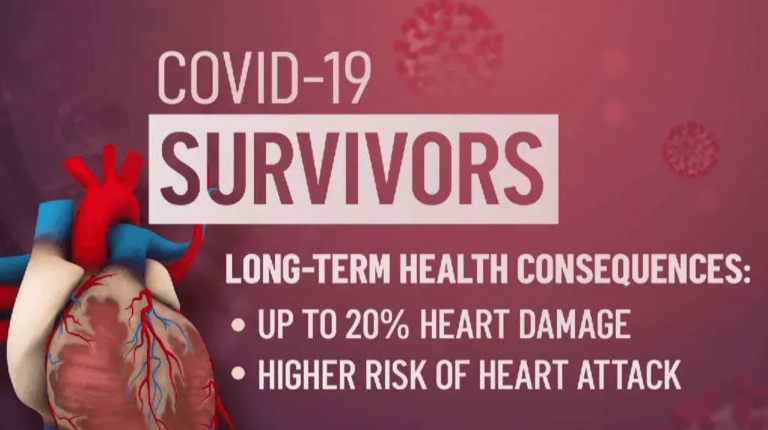
COVID-19 and Vascular Complications
For the past several months, much of the world has faced the harsh reality of the COVID-19 pandemic. Caused by severe acute respiratory syndrome coronavirus 2 (SARS-CoV-2), COVID-19 can result in several severe pulmonary and cardiovascular complications. Approximately 8 million people in the United States have been infected with the novel coronavirus as of the time of this article, which has been fatal for approximately 220,000 people. Further, in the state of New York, we’ve seen approximately 484,000 cases resulting in approximately 33,000 deaths.
Although COVID-19 generally causes critical illness, multiorgan dysfunction, and systemic inflammation, “the list of lingering maladies from COVID-19 is longer and more varied than most doctors could have imagined. Ongoing problems include fatigue, a racing heartbeat, shortness of breath, achy joints, foggy thinking, a persistent loss of sense of smell, and damage to the heart, lungs, kidneys, and brain.”[1] In short, in those who have recovered from COVID-19, regardless of the duration of severity of their illness, many are experiencing complex, difficult to diagnose conditions that cut across multiple systems of the human body.
Myocardial Injury and Myocarditis
In the past, infectious diseases like Middle East Respiratory Syndrome Coronavirus (MERS-CoV) have been linked to myocardial (heart muscle) injury and myocarditis (inflammation of the heart muscle that can cause arrhythmias, blood clots, heart failure, heart attack, stroke, death). Such viruses have been found to elevate troponin levels, and troponin is a group of proteins found in the bloodstream after muscle damage has occurred. COVID-19 related troponin elevation — which has averaged between 20 and 30 percent — has been associated with cardiac physiological distress, direct myocardial injury, or hypoxia. This means that without an event of heart attack, troponin levels in the bloodstream indicate some form of heart stress or heart muscle damage.
Acute myocarditis (heart inflammation) poses a significant diagnostic challenge for the COVID-19 pandemic because clinical severity can vary so significantly. Symptoms can range from chest pain, dyspnea, dysrhythmia, and acute left ventricular dysfunction. Nevertheless, “ECG and echocardiographic abnormalities in the setting of COVID-19 are markers of illness severity and are correlated with worse outcomes.”[2] Furthermore, in patients infected with COVID-19, elevated troponin levels have been directly linked to a high risk of adverse outcomes, includinig death.
Numerous studies have determined that between 7 and 17 percent of patients hospitalized with the novel coronavirus have experienced myocardial injury with increased troponin levels. Of those patients, between 22 and 31 percent required admission to the intensive care unit (ICU). Moreover, a study of 150 patients conducted in Wuhan, China, the location of COVID-19’s first appearance, found that as many as 7 percent of COVID-19 related fatalities were caused by myocarditis.
Acute Myocardial Infarction
Due to the extensive inflammation and increased frequency of blood clotting that result from COVID-19, these patients are likely at risk of acute myocardial infarction (heart attack). The cardiac enzymes troponin and creatine kinase may leak out of the heart and into the blood due to heart cells damaged by this virus. And elevated levels of such enzymes presented in blood tests identify heart trouble, specifically a heart attack. This is why blood tests are especially important, and among the specialists a cardiologist is best suited to review the results.
Acute Heart Failure and Cardiomyopathy
Acute heart failure can be the initial presenting symptom of coronavirus infection, exhibited by as many as 24 percent of patients.
Nearly half of those who experience COVID-19 related heart failure did not previously have a history of high blood pressure or cardiovascular disease.
Additionally, cardiomyopathy (a disease affecting the heart muscle) is the primary presenting symptom of COVID-19 in as many as 33 percent of patients. However, it is currently not clear if COVID-19 related heart failure results from new cardiomyopathy in patients or aggravation of historically undiagnosed heart failure.
Dysrhythmias
More than 7 percent of COVID-19 infected patients may experience palpitations, all at varying degrees of severity. However, sinus tachycardia is often seen in COVID-19 patients due to numerous, simultaneous ailments, including anxiety, fever, hypoxia, and hypoperfusion. And the existence of dysrhythmias, in conjunction with a viral illness, can typically be attributed to abnormal metabolism, hypoxia, and inflammatory stress.
One particular study, conducted in Wuhan, China, found the presence of dysrhythmias in 17 percent of hospitalized patients infected with the novel coronavirus, and 44 percent of COVID-19 ICU patients. When treating COVID-19 patients who experience dysrhythmias resulting from increased troponin levels, it is essential to consider the possible existence of acute coronary syndrome, acute myocarditis, and myocardial injury.
Venous Thromboembolic Event
The risk of venous thromboembolic events is exacerbated for those infected with the novel coronavirus. Potential contributing factors for this elevated risk include abnormal coagulation status, critical illness, multiorgan dysfunction, and systemic inflammation. Several studies propose severe coagulation pathway abnormalities in COVID-19 patients, such as D-dimer — a level that indicates the considerable presence of blood clot formation and breakdown within the body. D-dimer levels that exceed 1 ug/mL have been correlated to an elevated risk of fatality during hospitalization for patients infected with COVID-19. In particular, one study demonstrates that anti-coagulation may be linked with lowered mortality in grave coronavirus infections, or in those with D-dimer over six times the standard limit.
Cardiovascular Medication Interactions
Several of the newly presented medications for COVID-19 treatment interact substantially with numerous cardiovascular drugs. Specifically, anti-hypertensives, antiarrhythmics, anticoagulants, anti-platelets, and statins, have been found to interact with many of the current medications used to treat coronavirus patients’ antivirals, antimalarials, azithromycin, corticosteroids, and biologics. For example, Lopinavir/Ritovanir interacts with anticoagulants, antiplatelets, antiarrhythmics, and statins, which leads to QT and PR prolongation. On the other hand, Chloroquine and Hydroxychloroquine interact with antiarrhythmics, potentially causing myocardial toxicity, worsening cardiomyopathy, or altering cardiac construction. Before changing any of your medications or discontinuing them, consult a cardiologist who understands your medical condition.
Long-Term Effects
The novel coronavirus can effectively ravage the heart, leaving multiple cardiac complications in its wake. If this virus directly invades heart cells, it can cause permanent damage or destruction — and the extensive inflammation that results from COVID-19 can significantly affect heart function. Moreover, this virus can debilitate ACE2 receptors, which help safeguard heart cells and lower angiotensin II — a hormone that contributes to hypertension—and fighting COVID-19 places enormous amounts of stress on the body, provoking adrenaline and epinephrine release, which can also harm heart health.
How well and how fast the heart heals in the aftermath of COVID-19 infection may determine an irregular heartbeat’s existence or persistence. And although many coronavirus patients had preexisting conditions like diabetes and high blood pressure, patients who lack any apparent risk factors have also exhibited cardiac abnormalities. One study published in JAMA Cardiology in July 2020 found that 78 of 100 COVID-19 patients, many of whom were previously in excellent health, presented heart irregularities when evaluated ten weeks post-recovery, typically heart muscle inflammation.
The Importance of Following Up with a Cardiologist
Patients with heart disease are encouraged to keep in contact with their doctors during this COVID-19 pandemic, carefully complying with medication to keep their heart condition under control. And if they happen to contract the coronavirus, they should, without a doubt, request a follow-up exam with their cardiologist after they recover from the virus to establish any further heart damage that may have occurred. Furthermore, patients without known heart conditions or cardiovascular disease should also follow up with a cardiologist. Symptoms like shortness of breath and chest pain that remain after recovery could be linked to COVID-19 related lung or heart damage.
With the help of a skilled and experienced medical professional, individuals can better understand the effects that COVID-19 has had on their heart, and the best ways to address and manage any resulting heart damage. Dr. Beheshtian is an interventional cardiologist who has treated thousands of patients in New York and elsewhere. She is extremely knowledgeable about treatment paths for various types of cases, mild or complex. Please feel free to contact Avicenna Cardiology’s office with any questions or to make your appointment today.

